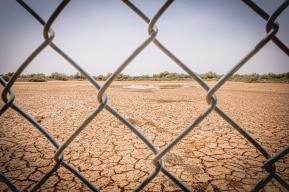مقال
الرهانات الفلسفية والأخلاقية لتغيّر المناخ

أصبحت الإنسانية اليوم في وضع المُستدان. فهي تستهلك، سنة بعد سنة، أكثر من القدر الذي تستطيع الطبيعة توفيره. هذا الاستهلاك المفرط له تداعيات مباشرة على المناخ. وحتّى نتبيّن الرهانات المُتصلة بالموضوع، يُوضّح لنا برنار فالتز، الفيلسوف وعالم الأحياء، العلاقات المُعقّدة بين الإنسان والطبيعة، ليستعرض بعد ذلك النواحي الأخلاقية للتعامل مع تطوّر المناخ.
بقلم برنار فالتز
إن تطوّر المناخ الذي يعتبر من أكبر تحديات عصرنا، متّصل بحياتنا اليومية بقدر ما هو متصل بالنظام الجغرافي السياسي العالمي. فهو يُمثّل أحد أبعاد أزمة بيئية شاملة نتجت مباشرة عن العلاقات المُعقّدة بين الإنسان والطبيعة. ويُمكن تحليل تلك العلاقات بالاعتماد على أربع مقاربات كبرى.
حسب المقاربة الأولى المنسوبة إلى ديكارت، تمثل الطبيعة جملة من الأشياء الموضوعة تحت تصرّف الإنسان. كان مشروع هذا الفيلسوف الذي عاش في القرن السابع عشر والمعاصر للعالم غاليلي، والذي يُعتبر من أكبر مُؤسسي الحداثة، يتمثل في جعل علم الأحياء مماثلا لعلم الفيزياء الناشئ. كان يدعم فكرة «الحيوان الآلة». أي أن الكائن الحيّ ليس سوى مادّة جامدة مُنسقة بشكل مُعقّد. والكائن البشري هو الوحيد الذي يتمتع بروح جوهرية مُتميّزة عن الجسم، ممّا يجعل منه الجنس الوحيد الجدير بالتقدير. أما المتبقي من الطبيعة، الحيّ منها أو الجامد، فهو يندرج ضمن عالم الأشياء الموضوعة على ذمّة البشر. كان ديكارت يحتقر المحيط تماما وينظر إليه من حيث مصلحته ويعتبره موردا لا متناهيا يُمكن للإنسان أن ينهل منه دون تردد. ويتبيّن لنا إلى أي مدى أدت مثل هذه الافتراضات المسبقة إلى استعمال الطبيعة بكل أشكالها، دون اكتراث: الفلاحة، والصيد البحري، وتربية المواشي بشكل مكثّف، واستنفاد المعادن والتلوّث بجميع أنواعه...
وتحمل المقاربة الأخرى المتمثلة في النزعة البيئية العلمية نظرة مخالفة تماما للعالم. لقد عرض عالم النباتات البريطاني آرثر جورج تانسلاي سنة 1937 مفهوم النظام البيئي الذي أحدث ثورة في النظرة العلمية للطبيعة. وتتمثل مرجعية هذا المفهوم في مجمل تفاعلات مختلف أنواع الكائنات الحيّة في ما بينها، وفي تفاعلات مجمل الأحياء مع الوسط الطبيعي: الأرض، الهواء، المناخ... ومن هذا المنظور، يكتشف الإنسان من جديد أنه ينتمي إلى الطبيعة كعنصر من النظام البيئي. بل وأبعد من ذلك، أن هذا النظام البيئي هو وسط محدّد، ذو مخزون محدود، سواء قبل تدخّل الإنسان أو بعده.
إلا أن عديد المفكرين اعتبروا المقاربة البيئية العلمية غير كافية. على سبيل المثال، يرى المؤيّدون لمفهوم البيئة العميقة أن جوهر الإشكال في المقاربة العلمية، بما فيها البيئيّة، يتمثل في المقام المركزي للإنسان. هم يدعون إلى فلسفة كليّة تضمّ الإنسان إلى مجمل الكائنات الحية، دون منحه أية مكانة خاصة، يكون فيها احترام الحيوان مماثلا لاحترام الإنسان.
ويحاول المفهوم الأخير للعلاقات بين الإنسان والطبيعة أن يقف موقفا حذرا أمام راديكالية مؤيدي البيئة العميقة، وفي نفس الوقت يؤكد على وجاهة نقدهم للنظرة البيئية العلمية. ويعتبر أن الطبيعة والإنسان يتعايشان ويتداخلان في ماهية حيّة تحظى باحترام أكبر. من الممكن احترام الحيوان في حد ذاته، دون أن يعتبر في مقام الإنسان.
أي كائن حيّ أو نظام بيئي مُعيّن جدير بالاحترام باعتباره من الإنجازات الرائعة للطبيعة، مثلما يعتبر العمل الفني انجازا رائعا للإنسان. إن مرجعية البعد الجمالي لأي إنجاز متصلة ببعد أساسي للواقع، لا يقدر أن يكشف عنه غير الفنان. لكن مثل هذه العلاقة لا تُؤدّي إلى اعتبار العمل الذي يتم احترامه في نفس مقام عمل الإنسان. من الممكن ترتيب القيم حسب أهميتها. فالحيوان، وبعض النظم البيئية وبعض المشاهد الطبيعية، تُصبح جديرة بالاحترام حسب طريقتين: الإنسان هو الذي يُقرّر أن يحترمها، وطريقة الاحترام هذه لا تُضاهي الاحترام الذي يجب منحه للإنسان.
نقطة التقاطع بين العلم والسياسة
باعتباره أحد أبعاد الأزمة البيئيّة، يفتح تغيّر المناخ الطريق أمام تفكير أكثر خصوصيّة يتمحور حول العلاقات بين العلم والسياسة.
يتحمل العلم مسؤولية ثقيلة في بروز المشكلة المناخية. إن دخولنا في عصر الأنثروبوسين يعود، إلى حدّ كبير، إلى القوّة الهائلة التي تطوّرت بفعل التكنولوجيات الحديثة واستعمالها اللامحدود من طرف القوى الاقتصادية: فلأوّل مرة في التاريخ، تُؤدّي الأنشطة البشرية إلى تغيير عدد من خصوصيات المحيط بالنسبة للبشرية قاطبة.
لكن العلم يُمكّننا أيضا من الوعي بالمشاكل المرتبطة بالأزمة البيئيّة. فهو يقوم بدور حاسم في بلورة سيناريوهات من شأنها أن تخول لنا التصرّف العقلاني في الأزمة المناخية. قد يقودنا العلم إلى الهلاك، لكنه يُمكن أيضا أن يكون سبيلا للنجاة. وتبقى المقاربة العلمية، لما يتم إدماجها في مفهوم للواقع أكثر شمولية، أساسية في التحكّم في التغيّر المناخي.
غير أن الديمقراطية لا تعني التكنوقراطية... في الديمقراطية، السياسي هو الذي يتّخذ القرارات. ويُميز عالم الاجتماع الألماني ماكس فيبر (1864-1920) بين مجال الوقائع ومجال القيم. من حيث المعرفة، العالم هو أخصّائي الوقائع، ويعود إليه تحليل الأوضاع واقتراح سيناريوهات مختلفة تتلاءم مع القيود البيئية. أما السياسي، فهو يتصرّف حسب القيم التي التزم بالدفاع عنها. وفي النظام الديمقراطي، يحصل على شرعيته بفعل انتخابه. فهو يُنتخب حتى يختار، تحديدا، السيناريو الموافق لنظام القيم الذي يتبنّاه. تقتضي التغيّرات المناخية تحاليل فنيّة في غاية التعقيد لا تتلاءم دائما مع التوجّهات المرسومة من قبل السياسيين.
الأخلاق البيئيّة وتغيّر المناخ
إلا أنه لا بد من الاعتراف بأننا دخلنا فترة انتقالية في اتجاه مجتمع تكيفه، بشكل قاطع، القيود البيئيّة. إن التزام كل فرد في حياته اليومية، وتصرف مختلف الفاعلين الاقتصاديين في أنشطتهم كلٌّ في مجاله – بدءا بالمؤسسات الصغرى والمتوسّطة، وصولا إلى أقوى الشركات الكبرى مُتعدّدة الجنسيات -، والتزام هياكل الدولة وكذلك الهياكل الوسيطة – اانقابات، واتحادات الشركات، والمنظمات غير الحكومية...- كل ذلك يُمثّل شروطا ضرورية لتحقيق عمل ناجع.
ذلك أن الرهان الأساسي هو مستقبل البشرية. وما يدفعنا للعمل هو ذلك الوعي بأن الحياة على الأرض يُمكن أن تُصبح أصعب، بل وحتى مستحيلة، إذا لم نتمكّن من السيطرة على التطوّر المناخي. كلنا يعرف «مبدأ المسؤولية» الذي وضعه في أواخر السبعينات الفيلسوف الألماني هانس يوناس، بشأن المسائل البيئيّة تحديدا: «أعمل بطريقة تجعل تأثير عملك متلائِما مع استمرارية الحياة البشرية الأصلية على الأرض». وعلينا، من هنا فصاعدا، أن نضع تصورا للحياة الاجتماعية المعاصرة يأخذ بعين الاعتبار انشغالنا باستمرارية النظام على المدى الطويل، بما في ذلك مسؤولياتنا إزاء الأجيال القادمة.
ولا بد أن تتلاءم اهتماماتنا بالشؤون البيئيّة مع متطلبات العصر من حيث الأخلاق، أي احترام حقوق الإنسان والمساواة بين كل الأفراد. فالشعوب ليست كلها متساوية أمام التحدي المناخي. ومن المفارقات أن الدول الأكثر فقرا هي التي تعاني الأكثر من احترار المناخ دون تحكم. وبالتالي، يجب أن يُؤدّي احترام حقوق الإنسان إلى مبدأ التضامن الدولي، وهو وحده الكفيل بضمان تصرّف شامل للتطور المناخي وفي نفس الوقت اتخاذ إجراءات خصوصية بشأن الوضعيات المُعقّدة. إن مبدأ المسؤولية إزاء الأجيال القادمة ومبدأ التضامن مع الجميع مبدآن ضروريّان للتصرّف العادل في الأزمة البيئيّة.
للمزيد من المعلومات:
المبادئ الأخلاقية المتعلقة بتغير المناخ
الصورة: نيلي أزيفيدو
By Bernard Feltz
A major challenge for our time, climate change concerns both our daily lives and the world geopolitical order. It is one of the dimensions of a global ecological crisis, a direct consequence of the complex interactions between humans and nature. These relationships can be divided into four main approaches.
The first, that of Descartes, considers nature to be a set of objects made available to human beings. The seventeenth-century philosopher – a contemporary of Galileo and considered a great initiator of modernity – advocated establishing life sciences that were similar to the emerging physical sciences. He defends the idea of an “animal machine”. Living things are nothing more than inert matter organized in a complex way. Only the human being has a substantial soul distinct from the body, making it the only respectable species. The rest of nature, living or inert, is part of the world of objects at humanity’s disposal. Descartes has no regard for the environment, which he views in a utilitarian way, and considers an infinite resource that humans can draw upon without any qualms. We can see to what extent such assumptions have led to the shameless exploitation of nature in all its forms: agriculture, fishing, intensive livestock farming, mineral depletion, pollution of all kinds.
Ecological science is another approach, which conveys a completely different vision of the world. In 1937, the British botanist, Arthur George Tansley, proposed the concept of the ecosystem that would revolutionize the scientific relationship with nature. This concept refers to all the interactions of the various living species among themselves, and of all living organisms with the physical environment: soil, air, climate, etc. In this context, man rediscovers himself as belonging to nature, as an element of the ecosystem. Moreover, this ecosystem is a finite environment, with limited resources, both upstream and downstream of human activities.
But many thinkers consider that the ecological science approach is insufficient. Deep ecologists, for example, believe that the core of the problem in the scientific approach, including the ecological one, is anthropocentrism. They advocate a philosophy of the totality that integrates humans with living organisms as a whole, without granting them any particular status. Respect for animals is the same as respect for humans.
A final understanding of human-nature relations attempts to keep a fair distance from the radicality of deep ecologists, while emphasizing the relevance of the criticism of ecological science. Nature and humans coexist and interpenetrate in a more respecting way of living. An animal can be respected for itself, without being given the same status as a human being.
A living species or a particular ecosystem are to be respected as remarkable achievements of nature, just as a work of art is a remarkable accomplishment of humanity. The aesthetic dimension of a work of art reflects a fundamental dimension of reality that only the artist is able to reveal. But such a relationship does not imply that the respected work has the status of a human. A hierarchy of values is possible. Animals, certain ecosystems and landscapes become respectable in two ways – it is the human being who decides to respect them, and it is a way of respect that does not equate with the respect due to humans.
At the crossroads of science and politics
A dimension of the ecological crisis, climate change paves the way for a more specific reflection on the relationship between science and politics.
Science bears a heavy responsibility for the emergence of the climate problem. It is largely because of the impressive power developed by new technologies and their unlimited use by economic powers that we have entered the Anthropocene. For the first time in history, human activities are leading to changes in certain environmental characteristics that affect all of humanity.
But science also makes us aware of the problems related to the ecological crisis. It plays a decisive role in the development of scenarios that could lead to the rational management of the climate crisis. Science can destroy us, but it can also save us. Integrated into a broader understanding of reality, the scientific approach remains decisive in controlling climate change.
However, democracy is not technocracy. In a democracy, it is the politician who makes the decisions. The German sociologist Max Weber (1864-1920) distinguished between the factual realm and the realm of values. On the knowledge side, scientists are specialists in facts. They are responsible for analysing situations and proposing various scenarios that are compatible with ecological constraints. Politicians, on the other hand, act according to the values they are committed to upholding. In a democratic system, they derive their legitimacy from their election. They are elected to choose precisely the scenario that fits their value system. Climate change involves highly complex technical analyses, which are not always in line with policy directions.
Environmental ethics
Nevertheless, it must be acknowledged that we have begun a transition towards a society shaped decisively by ecological constraints. The involvement of everyone in their daily lives, the work of the various economic actors in their respective activities – from small and medium-sized enterprises to the most powerful multinational trusts and the involvement of state structures and intermediary structures, trade unions, business federations, non-governmental organizations (NGOs), etc. – are essential conditions for effective action.
Because the fundamental issue is the future of humanity. What pushes us to act is this realization that uncontrolled climate change can cause human life on Earth to become much more difficult, if not impossible. We know the “imperative of human responsibility” principle that the German philosopher Hans Jonas developed in the late 1970s, thinking precisely of ecological issues: “Act so that the effects of your actions are compatible with the permanence of genuine human life on Earth.”
From now on, it is a question of conceiving contemporary social life by integrating into it the concern for the sustainability of the system in the very long term, by including future generations in the scope of our responsibilities.
These environmental concerns must be consistent with contemporary ethical requirements, namely respect for human rights and equal consideration for all human beings. Not all human populations are equal in the face of the climate challenge. Paradoxically, the poorest countries are often those most affected by uncontrolled global warming. Respect for human rights must therefore lead to a principle of international solidarity that alone can guarantee both the global management of climate change and that specific measures for particularly complex situations will be taken. The principle of responsibility for future generations and the principle of solidarity of all towards all are essential for an equitable management of the ecological crisis.
Bernard Feltz
A Belgian biologist and philosopher, Bernard Feltz is Professor Emeritus at the Catholic University of Louvain. His research focuses on the philosophy of ecology, bioethical issues and science-society relations. He is currently Belgium’s representative on UNESCO’s Intergovernmental Bioethics Committee (IGBC).











